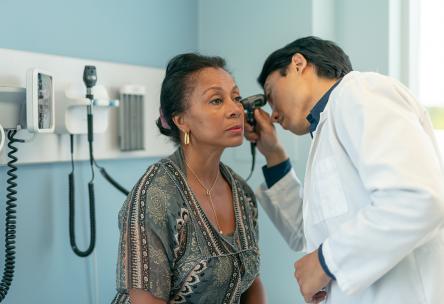
Log in to your secure member website to file a claim, check on a claim status, file an appeal and more.
Ignoring hearing loss can harm your physical and mental health. Keep reading to learn why it’s important to have regular hearing exams.

While it may sound strange, the effects of hearing loss reach well beyond your ears. In fact, it can affect you from head to toe. Hearing problems play a role in brain health and mood. You can also get hurt by not hearing warning sounds, like sirens or horns. What’s worse is that people with hearing loss wait an average of seven years before seeking help.1 And, as more time passes, the chances of hearing loss-related health issues go up.
It shouldn’t be that way. You can catch hearing loss early by staying on top of your annual hearing exams. And there are many ways your doctor can help preserve and improve your hearing. They can remove wax blockages, for instance, or recommend hearing aids and other devices that can strengthen sound.
If you’re due — or overdue — for your hearing exam, here are five reasons to schedule one today.*
There’s a connection between hearing loss and mental decline. Research has found that the worse your hearing loss is, the greater your risk of developing dementia as you get older.2 This may be partly because hearing loss can exhaust your mental reserve — that’s your brain’s ability to adapt and find different ways of completing a task.
Hearing loss can also make it harder to communicate, leading some people to avoid being social. That can take away things that keep the brain active and engaged, such as talking with others, trying new things and being active.2 “Over time, the less we stimulate the brain and engage our surroundings, the quicker our mental acuity is thought to decline,” says Kenny F. Lin, M.D. He’s an otolaryngologist (ear, nose and throat doctor) at Houston Methodist Hospital.
Most of our plans include coverage for hearing exams and hearing aids through a network provider. Hearing benefits generally include one annual routine hearing exam and hearing aid fitting covered at 100 percent. Check your Evidence of Coverage (EOC) to learn more about hearing coverage and benefits.
Check your coverage/benefits. Go to your secure member website at AetnaMedicare.com/Login to register or log in.
Hearing loss is linked to feelings of depression, anxiety and frustration in adults.1 Older adults with hearing problems have been found to have a nearly 50 percent higher rate of depression, compared to those with healthy hearing.3 “Patients with hearing loss get frustrated with their inability to communicate easily. And as they withdraw from social interactions, they become increasingly at risk for depression,” Dr. Lin notes. “It can feel very powerless.”
Studies show that heart disease has been linked to hearing loss. Experts aren’t sure which one comes first or if one causes the other. It may be that they share some of the same risk factors.4
For example, researchers know that diabetes, high blood pressure and smoking cause blood vessel damage that can lead to heart disease, explains Elliott D. Kozin, M.D., a physician at Mass Eye and Ear in Boston. They believe those same factors hurt the vessels that carry blood to the ears too. And that could lead to hearing loss.
If your ear doctor finds that you have hearing loss, it could be a sign that you’re at risk for heart disease. You should follow up with your primary care provider(PCP).5 They can make a referral to a hearing doctor.

Log in to your secure member website to file a claim, check on a claim status, file an appeal and more.
Hearing loss has been found to go together with social isolation and loneliness.6 It makes sense. When partners, family members, friends and coworkers feel like you’re not listening or communicating well with them, they may feel frustrated or hurt. For people who struggle to hear, conversations become less enjoyable. And their self-confidence in social settings can drop. “Over time, this frustration and difficulty communicating can strain personal relationships,” Dr. Lin says.
Older adults with hearing loss have a much higher chance of falling, research has found.7 It may be because they’re losing postural control. That’s the ability to stay in control and balanced during movement.8 “That makes sense, because the inner ear plays a role in balance,” Dr. Kozin says. Plus, if your hearing is weak and you’re out in public, you may be less likely to hear cars, cyclists or other pedestrians. That can set you up for collisions or other accidents.
If you suspect your hearing isn’t as strong as it used to be, don’t wait to get your hearing checked, advises Dr. Kozin. The same goes if the people in your life have suggested that you’ve missed or misunderstood parts of conversations. It’s not just your hearing that’s at stake — your physical, mental and emotional health are too.
*Some plans don’t offer a hearing benefit. Check your Evidence of Coverage (EOC) for details.
You can speak to a licensed registered nurse 24/7 to get answers to your questions about allergies and more. Call 1-800-556-1555 (TTY: 711).
SOURCES
For language services, please call the number on your member ID card and request an operator. For other language services: Español | 中⽂ | Tiếng Việt | 한국어 | Tagalog | Pусский | ةيبرعلا| | Kreyòl | Français | Polski | Português | Italiano | Deutsch | ⽇本語 | فارسی | Other languages…
See Evidence of Coverage for a complete description of plan benefits, exclusions, limitations and conditions of coverage. Plan features and availability may vary by service area. The formulary, provider and/or pharmacy network may change at any time. You will receive notice when necessary. Participating physicians, hospitals and other health care providers are independent contractors and are neither agents nor employees of Aetna. The availability of any particular provider cannot be guaranteed, and provider network composition is subject to change.
©2025 Aetna Inc.
Y0001_NR_33725_2023_C
2170180-07-01
Call us at 1-833-570-6670 (TTY: 711), 8 AM and 8 PM local time, 7 days a week. Or visit Aetna.com/Medicare